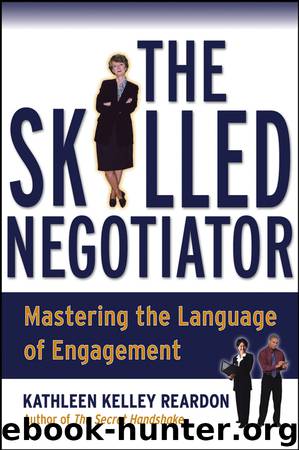The Skilled Negotiator by Kathleen Reardon

Author:Kathleen Reardon
Language: eng
Format: epub
ISBN: 9781118919248
Publisher: Wiley
Published: 2014-01-29T16:00:00+00:00
If, at each negotiation choice point, sixty-four strategy types had to be considered, most negotiations would fail by virtue of complexity alone. Communication expert Michael Roloff suggests that people handle such complexity by developing strategy categories that allow simplification of choices.
For example, a teenager may say to his or her parent, “If you buy me a new car, I promise that I won’t drive yours anymore.”
The parent replies, “Let me warn you, cars are expensive to maintain. After gas and insurance, you won’t have any money left.”
The teen counters, “Let’s compromise. I will buy the gas and you pay for the insurance.”3
The teenager and parent have categorized their strategies as promise, warning, and compromise. What this suggests, Roloff says, is that people tend not to work with an onerous list of strategies when determining what to say. Rather, they think first of what type of strategy they need at the time and then select among specific options with those categories. To make sense of what is being said to them and to help determine their own responses, people also impose categories on the comments of others. Sometimes they do so strategically; that is, in a manner that allows them to respond in a preferred way. Roloff’s second example is useful in clarifying how this works:
Strategic categories may be evident as individuals comment about each other’s discourse. The aforementioned teen may say to the parent, “If you don’t buy me a car, I will just take yours.”
To which the parent replies, “Don’t threaten me!”
The teen then retorts, “Why not? You always order me around!”
The discourse of the teen has been placed by the parent into a strategic category called threat, and the teen views the parent’s prior discourse as orders.4
This kind of category imposition limits the options of the other side unless they notice they are being hemmed in and decide to move in a different direction—perhaps by ignoring or refusing to react to the category. Reactions can be dangerous in negotiation. If, when the other side accuses you of making a threat, you automatically react defensively, you have lost some control by reacting rather than responding. It’s easy to see how this can work in a clever negotiator’s favor. Armed with the knowledge that the other party tends to react quickly rather than respond thoughtfully, the clever negotiator can lead that party to say or do a number of things that the negotiator may wish them to do. In Roloff’s second example, the teenager may actually want to cause a fight to legitimate an indignant storming from the room. This leaves the parent feeling upset, which suits the teenager quite nicely. If the parent decides not to succumb to upset, does not allow the teenager’s categorization of her comments to take hold, but instead proceeds with a considered response, the teenager’s outburst and retaliatory categorization of the parent’s comments is less likely to win the day. It takes an observant parent with steely nerve to step out of such a limiting scenario.
Download
This site does not store any files on its server. We only index and link to content provided by other sites. Please contact the content providers to delete copyright contents if any and email us, we'll remove relevant links or contents immediately.
Hit Refresh by Satya Nadella(8338)
The Compound Effect by Darren Hardy(7559)
Change Your Questions, Change Your Life by Marilee Adams(6641)
Nudge - Improving Decisions about Health, Wealth, and Happiness by Thaler Sunstein(6633)
The Black Swan by Nassim Nicholas Taleb(6191)
Daring Greatly by Brene Brown(5641)
Deep Work by Cal Newport(5464)
Principles: Life and Work by Ray Dalio(5322)
Rich Dad Poor Dad by Robert T. Kiyosaki(5149)
The Myth of the Strong Leader by Archie Brown(4789)
Man-made Catastrophes and Risk Information Concealment by Dmitry Chernov & Didier Sornette(4736)
Big Magic: Creative Living Beyond Fear by Elizabeth Gilbert(4723)
The Slight Edge by Jeff Olson(4722)
Discipline Equals Freedom by Jocko Willink(4635)
Digital Minimalism by Cal Newport;(4542)
The Motivation Myth by Jeff Haden(4527)
Stone's Rules by Roger Stone(4415)
Management Strategies for the Cloud Revolution: How Cloud Computing Is Transforming Business and Why You Can't Afford to Be Left Behind by Charles Babcock(4131)
The Doodle Revolution by Sunni Brown(4043)
